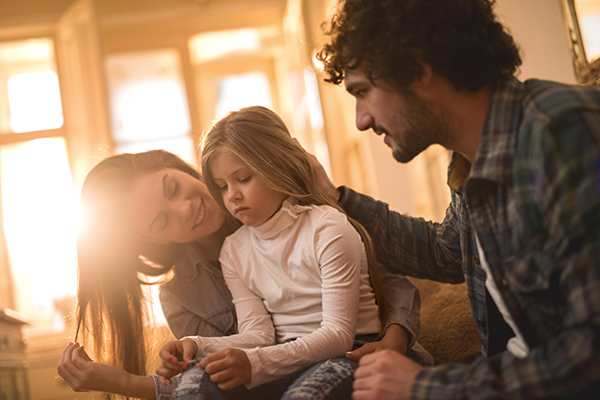
Thoughts from Kids in the House experts:
"[We] want to create a context where our kids can ask us plenty of questions where we can respond responsibly. We want to make sure that we make ourselves vulnerable. That's a frightening and troubling experience when I see police officers running into a school. Or that makes me feel sad when I see a community that has been wiped out because of a storm. So we want to make ourselves appropriately vulnerable and model that for our children. But we also want to create an environment where we assure our kids of an overarching, more universal sense of safety. But you know there's nothing that can ever come between the love that we share in our family. And you know that our connection as a family is always safe."
- Jimmy Bartz, Priest + Founder of Thad's
"This can be really challenging. What I usually recommend is to turn off the TV, turn off the radio and try to show your child as much as possible from what’s going on around. If your child has questions, answer their questions directly and simply, let them know that measures are been taken to keep them safe. That’s what their teachers are there for, their principals are there for."
- Dr. Tanya Altmann, Pediatrician
"After an attack, a drive by shooting or something terrible, like what happened in Connecticut, it's very important that you focus on how the child can feel safe. For example, children will say they don’t want to go to school because they don’t feel safe. And you might ask questions like well, who or what at school helps you to feel safe when you are there? If parents are freaking out, and they’re saying oh don’t worry, I’m not going to send you to school because it’s too frightening and they cling on to their child and hold them tight and say you’re not safe. Any place. So mom is going to keep you home from school until this whole thing blows over. That’s not healthy. You want to explain to your child, first of all, that’s rare. It’s very unlikely that’s going to happen in their school. It’s not that it’s impossible but that school is taking precautions to make sure that never happens. And you can ask them who makes them feel safe."
- Maggie Kline, School Psychologist + Therapist
"My heart breaks when you have to talk to your child about a school shooting. Maybe they witnessed it, maybe they heard about it, but it's one of those moments that you're like, "I want to quit this job as a parent," but don't quit. First of all, watch your non-verbal communication, if you look anxious, they'll feel anxious. Second, it's not your job to explain why there is evil in the world, what your job is, is to tell them how to find a solution to evil. Third, get to work, organize a fundraiser, talk to them about how they can give charity, who they can write letters to, how they can help raise awareness and help others. By getting into the solution and staying out of the problem, you'll give your children the best tools that they need."
"The most important thing that we can do is to let our children know that we are here to protect. That the police are there also to protect us. That fireman and other people are there to protect us. And it's okay for children to feel scared. What we suggest is, that when they're scared, hat they notice where in their body they feel the fear. What's the physical sensation. And then just allowing the sensation to move through. I remember a young child I've worked with after a drowning. And he had a real big tummy ache. So I had his mother put her hands on his tummy and ask them to see what was inside. And he felt a big knot. But then, as she said, "Okay. Is there any picture that comes when you see the knot?", and he said, "Oh. It's dark, and black, and yucky." And then, "What do you notice now? Does the color change? Does the feeling in your tummy change?". And the child said, "Oh, it's turning yellow. It's like a sun. I feel warm inside.". And that's it. You see, because that's that natural, that innate capacity we have to move through difficult situations. If we can learn to attend to the wisdom of our body."
- Peter A. Levine, PhD, Author of Trauma Proofing Your Kids & Developer of Somatic Experiencing



























